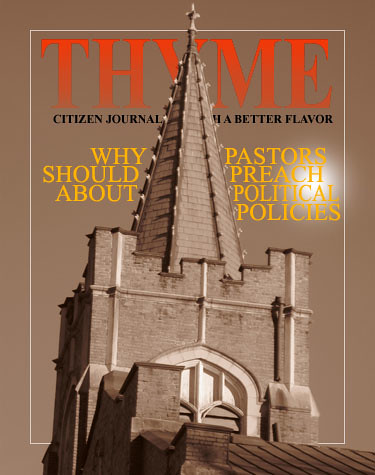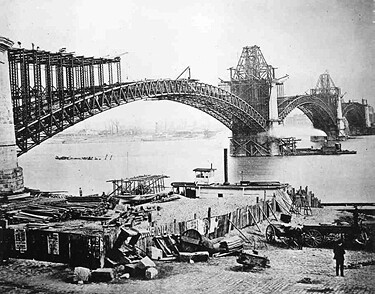
Volume XII, Issue VI
Four Reasons Christians
Should Care About Politics
[click to read]
By David Closson
During the course of a presidential campaign, it is common to hear evangelicals, especially younger ones, quip, “I’m just not that interested in politics,” or, “Politics just aren’t my thing.” These dismissive remarks are often delivered with a veneer of piousness implying that political engagement is inherently defiled, occupying an arena unfit for those serious about the gospel. For those inundated with television ads, robo-calls, campaign mail and the overall negative tone of politics, this might be a tempting position to adopt. However, it is not a position Bible-believing, gospel-loving Christians can or should accept as congruent with Scripture. (read more)
Dr. Wayne Grudem at the Watchmen on the Wall Conference in Washington DC, a conference for pastors and church leaders.
The gospel is a holistic message with implications for all areas of life, including how Christians engage the political process." -- David Closson
Public Service as a Holy Calling
William Wiberforce and the Abolition of Slavery

William Wilberforce (1759-1833).
A Milestone Monday Feature
Born to priveledge and prone to enjoy the pleasures his status afforded, William Wilberforce would have seemed an unlikely candidate for world changing reformer but G-d in his wisdom had bigger plans for the young dandy. He prepared himself for a life of politics while studying at St John's College, Cambridge.
Then, as now, religion was something considered good 'but not in excess.' Still Wilberforce found himself spiritually hungry and found faith. He sought out the council of John Newton, former slaver turned clergyman. Wilberforce was ready to forsake his place in Parliament to serve G-d but Newton convinced him that his service in Parliament could indeed be a great service to his Creator!
Wilberforce became convinced of two great missions: "the abolition of slavery and the reformation of manners." That is to say reform of society's priorities and treatment of people.
Wilberforce labored for almost half a century to end slavery in the British possessions. He pressed himself to exhaustion and stressed himself to the detriment of his health, but eventually he prevailed. The movie "Amazing Grace" tells of his life and gives a broader picture of the man. He was concerned about mistreatment of animals, healthcare, prison reform and a host of issues that press mankind still.
His work is far from finished. Human Trafficking [click to read] is an issue that modern day persons desiring to follow the lead of Wilberforce must step up to address.
The Next Supreme Court Justice
Scott Pruitt, Attorney General of Oklahoma, discusses the issues surrounding the appointment of the next supreme court justice at Hillsdale College's Kirby Center in Washington, D.C.
A Bridge Builder's Tale
[click to read]
James B. Eads and His Amazing Bridge at St. Louis
When looking down on the Mississippi River from the top of the Gateway Arch, many visitors remark upon the graceful-looking bridge to the north. It is hard to imagine that this bridge is the product of immediate post-Civil War engineering, that it was the first bridge built with structural steel, or that 15 men died of a mysterious illness while constructing it. Even more amazing is the fact that it was designed by a self-taught genius who had never built a bridge before.
The designer was James Buchanan Eads, born in Lawrenceburg, Indiana in 1820. (read more)

The Eads Bridge under construction in the 1870's.
The Flight 93 Election
[click to read]
By: Publius Decius Mus
2016 is the Flight 93 election: charge the cockpit or you die. You may die anyway. You—or the leader of your party—may make it into the cockpit and not know how to fly or land the plane. There are no guarantees. Except one: if you don’t try, death is certain. (read more)
An Author's Courage
[click to read]
By Lela Markham
Ray Bradbury writes: "Two weeks ago my mountain of mail delivered forth a pipsqueak mouse of a letter from a well-known publishing house that wanted to reprint my story “The Fog Horn” in a high school reader.
In my story, I had described a lighthouse as having, late at night, an illumination coming from it that was a “God-Light.” Looking up at it from the view-point of any sea-creature one would have felt that one was in “the Presence.”
The editors had deleted “God-Light” and “in the Presence.”
How did I react to all of the above?
By “firing” the whole lot.
By sending rejection slips to each and every one.
By ticketing the assembly of idiots to the far reaches of hell." (read more)
The America I Love

Tunnel through Mary's Rock on Skyline Drive in Virginia.

White Rock Falls, Blue Ridge Parkway in Virginia.

The Russian Bishop's House, Sitka, Alaska.
